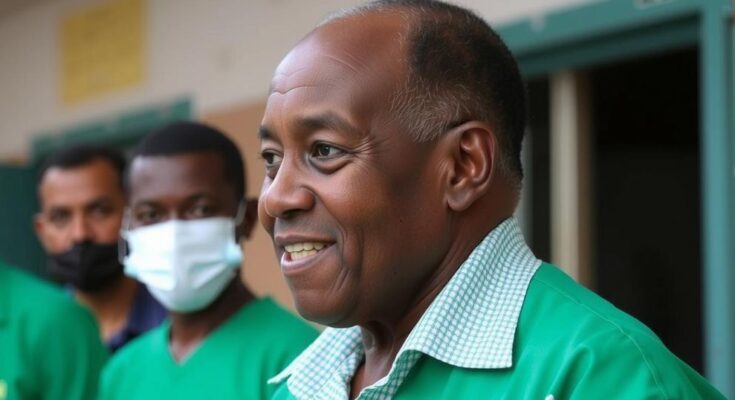The Comoros held legislative elections that were boycotted by many opposition groups citing a lack of transparency. President Azali’s son, Nour El Fath, is a candidate, with reports of disorganization at polling stations raising concerns about voter privacy and logistics. Assoumani’s government faces accusations of authoritarianism following disputed elections.
On Sunday, the Comoros Islands conducted legislative elections, although the process was significantly undermined by opposition groups who chose to boycott it amid concerns regarding the integrity and transparency of the electoral framework. Nour El Fath Azali, son of President Azali Assoumani, is campaigning for a parliamentary seat representing a district near the capital, Moroni. Reports indicated a delayed polling start due to logistical issues, raising further doubts about the conduct of the elections.
Issues of inadequate voting facilities were also noted, with observers commenting on the improvised nature of some polling stations. One booth was particularly criticized for its lack of privacy, featuring merely a box set on a chair. Before his appointment as secretary general, Nour El Fath Azali served as a personal advisor to his father, who returned to power following a coup in 1999. Critics argue this appointment consolidates Nour’s influence, allowing him to override decrees from other government officials.
President Azali’s administration has faced accusations of growing authoritarianism, especially following a disputed presidential election that occurred earlier in January 2024. Although several opposition candidates participated in this election, they have acknowledged the challenges posed by the ruling party, the Convention for the Renewal of the Comoros (CRC), which continues to dominate the political scene. Voter turnout was further complicated by concerns that election irregularities might mirror those witnessed in prior elections, notably in 2020 when a significant boycott allowed the CRC to secure full control.
Approximately 340,000 registered voters will elect thirty-three members of parliament in a two-stage voting process. The elections are anticipated to conclude with final results from a second round on February 16. Azali’s administration remains contentious, having declared a victory rate of 57 percent in the latest presidential elections, which critics allege were marred by irregularities and violence subsequent to the voting, resulting in fatalities and injuries.
The Comoros, an archipelago located in the Indian Ocean, has a history marked by political instability and authoritarian governance. The recent elections are significant as they follow a controversial presidential election in January 2024, which was marred by allegations of fraud and resulting in protests. President Azali Assoumani, having been in power through coups and controversial elections since 1999, has been accused by various opposition groups of oppressive practices and manipulation of the political landscape to favor his ruling party, the Convention for the Renewal of the Comoros. This election, marked by opposition boycotts and logistical challenges, highlights ongoing concerns regarding democratic processes in the nation.
The legislative elections in Comoros epitomize the challenges faced by democratic processes in the region, particularly the opposition’s refusal to engage with what they perceive as a compromised electoral environment. The appointment of Nour El Fath Azali and the CRC’s anticipated dominance further complicate the political landscape, raising concerns about the future of governance and the integrity of democratic institutions in Comoros. Continuous vigilance and international scrutiny may be necessary to uphold democratic values in such tumultuous contexts.
Original Source: www.barrons.com




